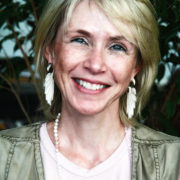Staying in the Flow: Advice for Memoir Writers and Others
Gilda Morina Syverson will lead a workshop on memoir, “Traveling Home, Again: Memoir’s Enlightening Path” at Charlotte Lit on Thursday, February 21st, from 6 to 9 p.m. Register
Only two years. That’s what I told myself when I first began to teach memoir writing at Queens University. I would do it for two years. My plan was to spend more time on my writing. But something happened. I not only fell in love with the process of writing my stories, but I fell in love with everyone else’s stories, too.
That was over 19 years ago. I am still in awe of what people discover when writing about themselves, their families, relatives, in some cases distant ancestors. We can write compelling stories by capturing flashes of memories, obsessions, dreams—night or day, an inspiring line from a poem or article and more. Then we take the thought or line, let it lead us as we write and write and write.
What I’ve told my students over the years is to capture the memory that comes to mind after giving them a prompt or reading them a poem. Do not think about editing, grammar, punctuation marks, and so on. Just write what flows! We’ll deal with crafting later.
I learned this process over thirty years ago when Natalie Goldberg wrote in her books about keeping that hand moving. NO THINKING ALLOWED. Not out loud! Although there is something valuable to learn about “Why not out loud?”
When a person says to me that he or she wants to write and starts telling me their story, I carefully, sometimes not so carefully, stop him or her and say, “Don’t tell me. Write it down.”
I’ve seen frustration on faces. Yes, they have a story to tell. But my intention is to get these people to their office, bedroom, back porch, or wherever they feel comfortable and put down that tale in written words. I imagine them saying to themselves, “I’ll show her. I’m telling that story anyway,” and then pen it in a journal, on a piece of paper, or type it into a Word document.
Ah-ha! A start! It’s where all writers—beginner or advanced—return to again and again.
Even though memoir (and poetry) are my loves, keeping that hand moving is a starter for all genres. When I sit down to write something new, brand new, I let it spill out—a morning dream, a cousin who has revealed a family secret, relatives from Italy who appeared on my grandmother’s doorstep. I let the story lead me where it wants to go. While writing, if Uncle Joe or Aunt Jane appear on your shoulder (metaphorically, of course) and have something to say, do not swat those voices away.
When it is time for crafting, editing is a creative process all its own. Since I am drawn to the editing process as much as the initial discovery, when I go back into the story, that’s when I play with the language, add specific and descriptive details, dialogue if need be, cut, paste, develop scenes.
The structure and spine of the story will slowly evolve. I let it lead me remembering what Anne Lamott said years ago when visiting Charlotte, that she edits each chapter seven, eight, nine times. It is in this process, where I get honest with myself or bring my writing to one of my critique groups; I can count on them to be open with me.
After all these years, I am still in awe of the stories that have grown out of people’s lives, their families, the places they have come from. I hope to hear a bit of your story one day—written down, of course!
Gilda Morina Syverson is an award-winning author for the memoir, My Father’s Daughter: From Rome to Sicily, and two poetry collections, Facing the Dragon and In This Dream Everything Remains Inside. She is at work on her second memoir. Gilda has been teaching and coaching memoir writing for over 19 years and is also on the faculty for Charlotte Lit’s Authors Lab. She has recently been featured on Charlotte Readers Podcast.

 Dennis Patrick Slattery, Ph.D., is Emeritus Faculty at Pacifica Graduate Institute. He is the author, co-author, editor or co-editor of 26 books, and the author of more than 200 articles on literature, psychology, culture and myth. He will publish three new works in 2019: Deep Creativity: Seven Ways to Spark Your Creative Spirit (Shambhala Press); a co-edited volume of the letters of Joseph Campbell; and a volume on Homer’s Odyssey. He continues to teach as Emeritus faculty and to offer “Riting Retreats” on exploring one’s personal myth. Dennis continues to take classes and paint in both acrylic and watercolor as well as ride his Harley-Davidson motorcycle through the Hill Country of Texas.
Dennis Patrick Slattery, Ph.D., is Emeritus Faculty at Pacifica Graduate Institute. He is the author, co-author, editor or co-editor of 26 books, and the author of more than 200 articles on literature, psychology, culture and myth. He will publish three new works in 2019: Deep Creativity: Seven Ways to Spark Your Creative Spirit (Shambhala Press); a co-edited volume of the letters of Joseph Campbell; and a volume on Homer’s Odyssey. He continues to teach as Emeritus faculty and to offer “Riting Retreats” on exploring one’s personal myth. Dennis continues to take classes and paint in both acrylic and watercolor as well as ride his Harley-Davidson motorcycle through the Hill Country of Texas. Kathie Collins, Ph.D., co-founder of Charlotte Center for Literary Arts, earned her graduate degree in Mythological Studies with an emphasis in Depth Psychology at Pacifica Graduate Institute, where she is currently an adjunct professor. A poet and lifelong student of Jungian psychology, Kathie thrives in the in-between space from which dreams and creativity emerge. She’s happiest when she can share that space with others and one of her great passions is bringing words and people together for transformative conversations. Kathie’s poetry has appeared in Immanence, Kakalak, Bible Workbench, and Between. Her chapbook Jubilee was published by Main Street Rag in 2011.
Kathie Collins, Ph.D., co-founder of Charlotte Center for Literary Arts, earned her graduate degree in Mythological Studies with an emphasis in Depth Psychology at Pacifica Graduate Institute, where she is currently an adjunct professor. A poet and lifelong student of Jungian psychology, Kathie thrives in the in-between space from which dreams and creativity emerge. She’s happiest when she can share that space with others and one of her great passions is bringing words and people together for transformative conversations. Kathie’s poetry has appeared in Immanence, Kakalak, Bible Workbench, and Between. Her chapbook Jubilee was published by Main Street Rag in 2011.